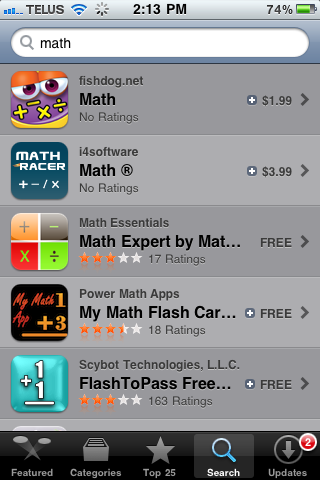I’m reading The Connected Family by Seymour Papert, and ran into a quote which I found appropriate.
"…learning multiplication facts by putting flash cards on the screen is not a new way of learning math. It is a polished-up version of the old ways and promotes to greater heights their worst and most mechanical features. Moreover it is often done in a spirit which I see as dangerously dishonest: Disguising [emphasis mine] flash cards as a game introduces an element of deception that undermines two fundamental educational principles.
First, learning works best when the learner is a willing and conscious participant. Second, deception and dishonesty in the teaching process make a mockery of the idea that schools should develop moral values as well as knowledge of math or history." ~ Seymour Papert, p19, The Connected Family, 1996
It was timely, because just this morning, I saw this tweet from Jason Klein:
Just searching now on my iPhone for math in the App Store, these apps showed up.

All five of these applications are based on learning math facts and arithmetic, and two of them even have the word "flash" in their name. Of the top twenty five math applications that I saw, 23 of them are essentially flash cards disguised as games. Two of them aren’t, one is called "Equation Genius" (it solves algebra equations), the other is called "Motion Math" (which lets students learn the relationship between fraction as symbols and visual representations of those fractions).
Could we please get more educators programming these apps? (If someone would donate me a Mac to work on, I’ll happily do it myself.)

Thomas Petra says:
I have conflicting thoughts on this. First, I think a strong foundation in the basic facts is essential for math students. I’ve always encouraged speed and mastery. This may be appropriate for arithmetic skills. Having said that, I think Mr. Klein’s sentiment applies to the majority of math applications on the small or big screen. The problem is a math curriculum that is concept-based and bloated. Computers and teachers train students how to solve problems but not how to understand them. Further investigation is limited because of the pressing need to advance to the next page.
I cringe whenever I see an attractive whiteboard demonstration dissolve into a multiple-choice offering. Perhaps more than any other subject math is focused on a right or wrong response, or in the case of computers: 1 or 0. I thinks math apps should be constructed more as a tool to accomplish a task than an ends to a mean. Calculators, slide rules, and abacus come to mind, but we should be able to do more than that in this century. On my website, RealWorldMath.org, I’ve tried to promote higher-level math lessons with Google Earth.
If a student reinforces his arithmetic skills on a phone app, then I’m fine with that; as long as it enables bigger and better things in the classroom.
September 17, 2011 — 9:51 am
Chris Hunter says:
I, too, have a problem with the numerous flash cards disguised as games math apps that are out there. I hadn’t thought of it from a moral perspective, but you’re absolutely right. I think the real power in having iPads in classrooms is in terms of having students communicate their thinking. I blogged about it here: http://reflectionsinthewhy.wordpress.com/2011/09/04/ipad-as-mathematical-communication-tool/ (sorry for the self promotion, easier than repeating my thoughts). It’s easy to be critical of what is out there. And it’s great that teachers look at advertised apps with a critical eye. But what would a good math app look like? What does teaching/learning through (as opposed to about) problem solving look like on an iPad? I think I could come up with some guiding principles, but I have a hard time visualizing the final product.
September 19, 2011 — 8:48 pm